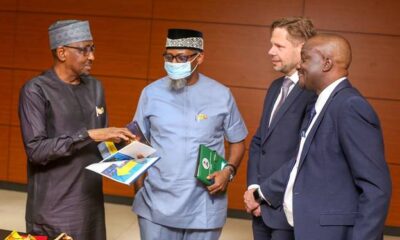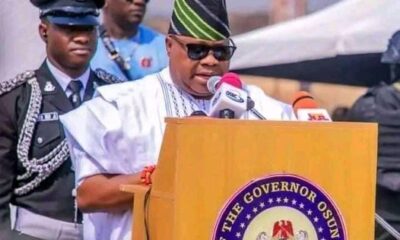Opinion
Nigeria’s Population: Blessing Or Problem?
The recent report on the world’s population increase to eight billion with Nigeria being the sixth most populous nation has renewed the concern about the nation’s soaring population and the need to manage it. Based on Worldometer elaboration of the latest United Nation’s data, Nigeria’s population is now 218,227,744, an equivalent of 2.64 per cent of the total world population. Discussing the development on national radio on Wednesday, the analysts dwelt more on the negative sides of Nigeria’s population which may not be unknown to many people. Key among the points they raised was that the huge population weighs heavily on the limited infrastructure in the country. They cited the public schools where equipment, hostels and other facilities originally meant for may be 30 people are today being used by about a hundred students or more; the roads that are constantly in a state of disrepair because of over usage, depletion of natural resources, poor access to health care and education, high rate of unemployment, high poverty rate, insecurity, overcrowding, environmental issues, among others.
As a matter of fact, these are challenges associated with poor management of population. That is why some people have posited that a large population is not a problem, that what is a problem is how it is managed or mismanaged as economic resource. China’s experience has laid credence to this assertion. Are we not marvelled at how China, a country of over one billion people, the most populous country in the world, has used the huge population to her advantage?According to a published white paper of the Government of China, captioned, “ China’s Population and Development in the 21st Century, faced with the challenge of huge population, weak economic foundation with relatively inadequate resources per capita”, the Chinese government formulated and implemented a population policy which conforms to China’s reality and has greatly contributed to the stabilisation of the national and the world population and to the promotion of human development and progress. The Chinese government is willing to continue its efforts together with the international community to practically solve the problem of population and development”
Of course, China has her own drawbacks, particularly on the issues of human rights, freedom of speech, freedom of association and all that. Her Communist system of government is not to be envied. But as per being able to manage and maximise her population, we must give it to her. The country is today dominating different industries. Many countries are trooping to China for the production of virtually everything because of the inexpensive manpower. Reports have it that China is the leading exporter of textiles and clothes in the world, taking advantage of her huge population. Other countries like Singapore, Taiwan and South Korea have also skillfully and productively managed their dense populations. The question then is what is Nigeria doing with her huge population? What is the government’s plan on putting the nation’s human capital into profitable use? Who says the success story of China and these other countries cannot be the case of Nigeria if the nation manages her population and other resources well? About 53.7 percent of Nigeria’s population are youth, ready to be empowered so as to contribute immensely to sustainable development and growth of the country. How is the nation turning this huge youthful population to economic assets?
Records from the National Bureau of Statistics (NBS) have it that 13.9 million Nigerian youths are unemployed. This huge number of vibrant, talented young men and women are viable tools for the insecurity bedevilling the nation. What is a better way of profitably engaging them than through technological training and support for the ones so disposed. This way, these young men and women can be turned into technicians, craftsmen, artisans and tradesmen who will contribute to national development through development of local fabrications, machines and tools for industrial use. One thinks it is high time the Ministry of Industry, Trade and Investment, the Ministry of Science and Technology and other relevant bodies harnessed all these raw talents and nurtured them for the good of the country. It is also important that attention be paid to the technical colleges in the country to ensure that the main goal of technical institutions, which is, to provide career-oriented training was not jettisoned. According to the Nigerian national policy on education, technical education should be concerned with qualitative technological human resources development directed towards a national pool of skilled and self-reliant craftsmen, technicians and technologists in technical and vocational education fields. The fact is that the curriculum, government policies, embezzlement of education development funds, corruption and other challenges faced by these technical colleges have impeded the actualisation of the objectives. What measures are being taken to make things right?
It is good that entrepreneurship is now taught as a compulsory subject in some higher institutions in the country. It should not end in theory. Let the syllabus be drawn in such a way that the students will go for several months of industrial training that will enable them to stand on their own upon graduation instead of searching for unavailable white-collar jobs. But a suitable environment must be created for small and medium scale businesses to thrive. Power supply should no more be epileptic, energy security should prevail and the diesel and PMS affordable. Then it will almost be a magic for the small businesses to survive. The need for the development of the agricultural sector to help in providing food, employment and other resources for the country has long been canvassed. As usual the government would always claim that huge investments are being made in the sector with little or nothing to show for it. The Presidential candidate of the Labour Party, Mr. Peter Obi, has not failed to use any given opportunity to remind us that Nigeria is sitting on a total land area of 910,770km2 (351,650sq. miles) and that the vast agricultural lands in the country, particularly in North is lying waste, promising just like many other political aspirants before him, to turn these arable lands to gold, if elected.
Painfully, the years of insecurity across the country have forced many farmers to desert their farms and seek other means of survival. Hundreds of them are languishing in Internally Displaced Peoples’ (IDP) camps. It is therefore imperative that in order to maximise the benefits of the population of Nigeria, leaders at the three tiers of government must effectively manage the population and nation’s resources. All the contestants across party lines should come up with concrete plans of how to solve the corruption problem in Nigeria, plan to revive our refineries so that local production of energy commodities can resume, plan to resuscitate the moribund cotton and textile industries, develop the education sector, tackle insecurity and other issues bedevilling the agriculture sector. Nigerians want their would-be leaders to go beyond the usual rhetoric and seemingly impossible promises to tell the citizens how they will turn the huge Nigeria’s human capital to a great economic strength. There is no doubt that when the majority of our young ones are gainfully engaged, the rate of insecurity, kidnapping and other forms of crime associated with the youth in the country will be reduced and the country will be better. As an expert said, “ a large population of unskilled, economically unproductive, unhealthy, and poorly educated young people is a burden to society.” The sooner this was tackled the better.
By: Calista Ezeaku
Opinion
The Girl Who Didn’t Dance
Opinion
Tradition or idolatry? The Debate Over Nhe-Ajoku

Opinion
Fubara’s Strategic Masterstroke

-
Sports1 day ago
Golfers Donate N6m To Charity Homes After Tournament
-
Opinion22 hours ago
The Girl Who Didn’t Dance
-
News3 days ago
2 Nigerians Rescued, 2 Others Missing After Deadly Shipwreck On Mediterranean – IOM
-
Business1 day ago
PenCom Completes Nov Retirees Payments, Declares End To Delayed Pension Disbursements
-
News21 hours ago
NELFUND Warns Students Against Fake Loan Portal
-

 News1 day ago
News1 day agoFG Suspends Planned 15% Import Duty On PMS, Diesel
-
Sports1 day ago
Bisi Open Championship: Coach Attributes Victory To Hard Work
-

 Politics1 day ago
Politics1 day agoOsun 2026: Why Adeleke Is Searching For Platform To Contest Poll – PDP Chieftain

